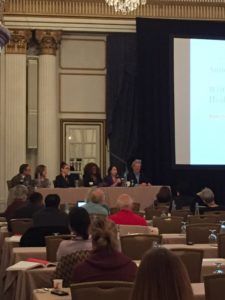Publishing Tips from a Literary Agents Panel

Short of real life experience in publishing, few resources can give you the depth of education in publishing provided at Harvard Medical School’s CME publishing course, especially if you are working on a health-related or self-help book. In addition to presentations, panels and workshops rich with information, there’s also time to meet agents, publishers, book coaches and other experts, run your ideas by them for feedback and fine tuning. You can even get feedback on your writing in the evening workshops we teach.
That said, this week I plan to bring you some highlights, including today’s post sharing information and publishing tips from the panel of literary agents who shared how one works with a literary agent and what agents are looking for.
On the Role of Literary Agents
Don Fehr: “A literary agent is a dealmaker, but we do much more than that. We manage authors’ careers.”
[bctt tweet=”“A literary agent is a dealmaker, but we do much more than that. We manage authors’ careers.” – @Don_Fehr”]

Linda Konner: Agents get paid typically through payments from publishers. We work on commission when you get royalties or subsidiary sales.
On the Author/Agent Relationship
Regina Brooks: “I’m looking for someone with a series of books—authors who can be franchised. I’m much more interested in working with one author who has ten books than ten authors with one book each.
Sally Ekus: “I’m looking for long term relationships [with my authors]. Be mindful of the kind of relationship you’re looking for.
On Finding a Literary Agent

Jeanne Fredericks: “Look at what an agent brings to the table, their specialties. Some of us have editorial background. Others have been publishers. Others have legal background and know the ins and outs of contracts.”

Albert LaFarge: “Most of us acquire authors through referrals. We rely particularly on people who know us and understand our strengths and interests. If you know someone in publishing, or someone who’s written a book, talk to them. Look at the acknowledgements pages of similar books. Subscribe to Publishers Marketplace.”
On Publishing Trends and Expectations

Regina Brooks: “You can’t just get in with no social media at all.” In fact, a large publisher recently said that their minimum is a 30,000 person following on social media.
People often wonder whether it’s worth having an agent (vs. going straight to a publisher). Julie Silver, MD, the course director and founder, pointed out that agents have all this industry-specific intelligence that the general public doesn’t have.
As Dr. Silver said, “Agents like to do lunch.” At lunch with acquisitions editors at publishing houses they find out exactly what specific publishing houses and editors are looking for today. They have built relationships over time. Publishers will take the time to read what agents send them, because, busy as they are, they know it will be time well spent.
I would add a few additional pluses that literary agents bring to the table, points we didn’t have time to get into during the panel:
- An agent can time submissions so that you are more likely to have several offers on the table at once. This is called an “auction” and every author wants to have one, because then your agent can leverage these offers for the best deal.
- Your agent also knows the specifics of negotiating a contract and will make sure you retain important rights and that the terms are in the best interest of the author—you.
- A literary agent knows acquisitions editors well—their strengths, weaknesses, personalities and preferences. It isn’t just about finding an acquisitions editor who wants your book. It’s also about finding the one who will do it justice and whose vision matches yours.
- [bctt tweet=”A literary agent can negotiate contract points that are important—beyond the amount of the advance.”]
Are there times to pitch a publisher directly, without an agent? Yes, especially for a very niched book with a small market. However, in most cases, when your market is a significant enough size to attract a larger publisher, you will want an agent by your side!
Have a question about working with a literary agent? Feel free to ask your publishing questions here.



Hi Lisa!
I need help finding an agent for a paranormal novel about a family afflicteday with demon possession.
Any suggestions?!
Misbah.
I wish I could help but that is so outside of my expertise. Good luck.